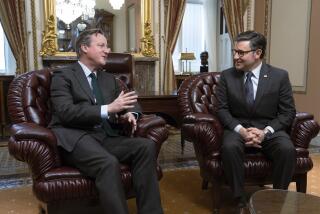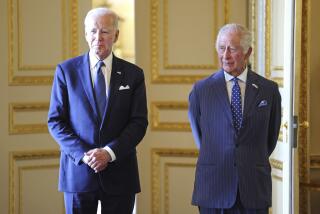Tremors in an Old Friendship
- Share via
Fears for what was once dubbed the “special relationship” between Washington and London prompted this week’s visit of British Prime Minister John Major to President Clinton. What’s at stake is nothing less than an extraordinary bilateral alliance that has fought two world wars together and has in so many other ways contributed to world order.
In the hands of Winston Churchill and Franklin D. Roosevelt--or even, for that matter, in those of Margaret Thatcher and Ronald Reagan--that relationship was special. But the current thought among the respective foreign policy establishments is that it would be better to bury the adjective special and replace it with something less elevating.
That would be a mistake. Each of the two nations needs an ally on which it can count in the crunch, and neither Washington nor London is likely to find anyone better for quite a long time.
The relationship ran into serious trouble even before Clinton’s election; during the U.S. presidential campaign operatives from the British Conservative Party helped the Bush reelection effort, an outrageous intervention in the internal political affairs of the United States that angered Clinton’s people.
Neither is London entirely happy with Clinton, of course. His decision to grant a visitor’s visa to the head of the Irish Republican Army’s political wing evoked bitter criticism from the British government--further evidence that the personal chemistry between Clinton and Major is not what it might be. However, chemistry is irrelevant: Thatcher and George Bush did not get on well, as her memoirs reveal, but bilateral relations were excellent.
Both Clinton and Major are masters of non-ideological common sense, which is the linchpin of the special British-American alliance. It is their job to get along: Too much depends on it.
More to Read
Sign up for Essential California
The most important California stories and recommendations in your inbox every morning.
You may occasionally receive promotional content from the Los Angeles Times.













